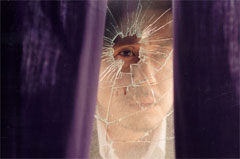
| HOME |
| NERVE |
| REVIEWS |
| ARCHIVE |
| EVENTS |
| LINKS |
| ABOUT US |
| CONTRIBUTORS |
| BACK ISSUES |
| CONTACT US |
 Old
Boy (18)
Old
Boy (18)
Directed by Park Chanwook
Showing at FACT from Oct 29 - Nov 11
Reviewed by Tim Kopp
The latest in a number of remarkable Korean films (Memories of Murder, A Tale Of Two Sisters) and garlanded with the Special Prize of the Jury in Cannes, Old Boy is told with gusto and conviction although the melange of sadism and bizarre humour is bound to divide audiences. (**** out of five)
Korea in the late 1980s. On his daughter’s birthday, Oh Dae-Su is abducted and locked up in a cell for no apparent reason. Having failed several suicide attempts, he learns from the television news that he is suspected of the murder of his wife. Over the course of fifteen years, he regains his physical strength and is about to make a desperate attempt to escape when his kidnappers finally release him. Disorientated but driven on by his desire to learn the truth, he searches for his tormentors while falling in love with Mido, a young girl working in a sushi bar.
One of the recurring themes in this film year is that of leading characters taking revenge for the ordeals they have suffered or for the killing of a loved one, and to find inner peace at the end of their quest: so far we’ve already had Quentin Tarantino’s two-parter Kill Bill, the dire Punisher and Shane Meadows’ respectable British entry Dead Man’s Shoes but Park Chanwook’s self-assured thriller is the most radical and nightmarish yet.
The picture not only blends wacky humour and extreme sadism in a manner reminiscent of Tarantino but is also the most poignant and successful expression of the hero’s agony and his realisation that he is becoming increasingly more like his tormentors: it’s a trait Oh-Dae Su shares with The Bride and Richard though neither Tarantino nor Meadows quite equals Chanwook and his leading actor Choi Min-sik in the rigour and intensity with which they portray Oh Dae-Su’s willingness to self-humiliation. This is intrinsically linked to the taboo issue of incest that lies at the heart of the film so that Old Boy can be read as a modern parable that relocates the Oedipus tale in the context of the gangster milieu and Korean society at large.
On its most immediate level, the film is an undeniably powerful blend of thriller and love story where, again akin to Tarantino’s films, mood abruptly changes to shocking effect and where moments of tenderness and compassion follow on acts of cruelty.
The skill and confidence with which Chanwook gives his film a compact structure and handles the twists is unmistakable and he is also more adept at propelling the plot forward than Tarantino whose self-indulgence made for such erratic pacing in either part of Kill Bill. Old Boy is as technically and stylistically inventive (for instance, Oh Dae-Su’s confrontation with dozens of Park’s men equipped with baseball bats is filmed in a striking uninterrupted tracking shot that lasts several minutes) and as literate as Tarantino’s work: an early hallucination sequence pays homage to Bunuel and Dali’s Un Chien Andalou while two scenes of dental torture recall Laurence Olivier’s treatment of Dustin Hoffman in Schlesinger’s The Marathon Man.
There are instances where Chanwook’s style borders distractingly on the crude and overly explicit while his concoction of excessive brutality and absurd slapstick has already been met with reservation or outright criticism in some quarters. Moreover, villain Woo-Jin apart, the characters are little more than stereotypes, with the film relying a bit too heavily on the strong performances and technical flourishes to make it worthwhile: all told, it’s an acquired taste.